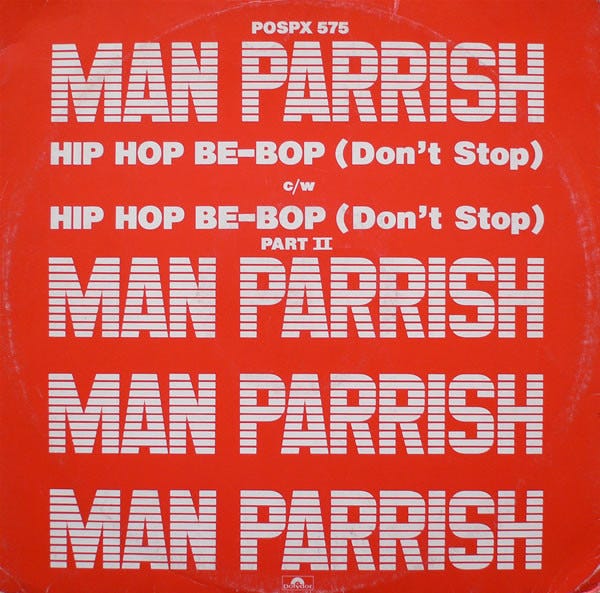The words ‘Hip Hop’ have appeared in the titles of hip hop records since the early 1980s, Man Parrish’s ‘Hip Hop, Be Bop (Don’t Stop)’ from 1982 being the first, yet there was a spate of releases throughout the decade which signposted the culture from which these songs were born; these were more than reifications. This set precedent for anthemic songs of the 1990s such as Nice & Smooth’s ‘Hip Hop Junkies’ (1991), Naughty By Nature’s ‘Hip Hop Hooray’ (1992), and Dead Prez’s ‘It’s Bigger Than Hip Hop’ (1999). The 2000s continued to deliver, with records like ‘Hip Hop’ by Royce Da 5’9” and ‘This Is Hip Hop’ by Termanology (both 2004), ‘Hip Hop Is Dead’ by Nas (2006) and the suggestive retort ‘Hip Hop Lives’ (2007) by KRS-One & Marley Marl; curiously from the 2010s the idea of incorporating ‘Hip Hop’ into song titles diminishes greatly, appearing rarely – the latest being Necro’s ‘Take Hip Hop Back’ from this year.
At a slight juxtaposition here, is the number of records from 1979 and 1980 with the word ‘Rap’ in the title: ‘We Rap More Mellow’, ‘Spoonin Rap’, ‘Willie Rap’, ‘Scoopy Rap’, ‘Family Rap’, ‘Doctor Love & Sister Love Rap’, ‘Rapper - Dapper – B’, ‘Dr. Ice Rap’, ‘CC Crew Rap’, ‘Death Rap’; it is not unexpected that these titles largely connect directly to the author-artist – most are structured as ‘Author-Artist Rap’ (i.e. ‘Doctor Love & Sister Love Rap’ by Doctor Love & Sister Love, ‘CC Crew Rap’ by CC Crew, and so on). What is perhaps more surprising, is the omission of ‘Hip Hop’ in song titles during the era that rap music moving out of an exclusively live setting (with live jams recorded on tape) to the production of vinyl records. But this is more than just a semantic shift between ‘Rap’ and ‘Hip Hop’. Here, rap records point directly to the action and performativity, rather than discourse of complex cultural observations and phenomena which hip hop was already becoming to be.
When these record titles containing ‘Rap’ are considered alongside those containing ‘Hip Hop’, strong clues arise to the direction of travel for hip hop culture, its growth and need for positionality vis-à-vis broader audiences. Within a short space of time, hip hop gained territory across the globe, yet its representational spaces, material culture, and rich histories were unrepresented globally until the arrival of more visual modes of practice – notably films such as Wild Style and Style Wars (both 1983), the one-off magazine show Graffiti Rock, and documentary Beat This: A Hip Hop History (both 1984).




